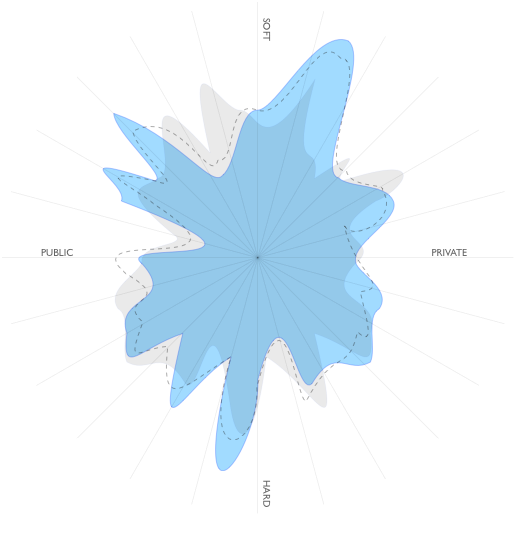First of all a short blurb:
Quantified Prestige is a reputation economy system invented by Michael Hrenka. The REPDEV Network aims at creating a global reputation economic ecosystem based on QP.
This category is used for all topics directly related to QP and to the REPDEV Network.There are a couple of introductory blog posts on QP at http://radivis.com/tag/quantified-prestige/
Version 0.03 of the QP documentation is available at http://radivis.com/public/quantifiedprestige003.pdf
I’ve copied this thread from a thread on the old Social Future Forum:
Quantified Prestige is the name of the reputation economy system that I’ve developed a couple of years ago. A full documentation is available under http://radivis.com/public/quantifiedprestige003.pdf. In short, it is a system based on one or more peer-to-peer networks in which registered users can allocate points to each other. The amount of points that a user gets from other users determines how much “Prestige” said user has. This “Prestige” is a quantified reputation index which mainly indicates how popular and esteemed a user is in that network. Basically, Quantified Prestige is a system that can be used to rewards people for all kinds of good behaviour. Which that broad application in mind, it is quite universally applicable.
However, the initial motivation for creating such a system was to solve the problem of artificial scarcity of digital goods. Digital goods like software, web pages, digitalized books, articles, genetic codes, pictures, music, patents, and so on have the property that they can be copied and distributed for virtually zero (marginal) cost. Our current economic paradigm is ill equipped to handle the potential abundance that this unusual property of digital goods would offer. Instead, artificial scarcity in the form of copyrights, patents, and intellectual property rights is introduced in order to provide incentives for the production of digital goods. While this modus of incentivization does work, it forces digital goods into an artificial market model, rather than to leverage the potential abundance that their almost free distribution would represent to the world at large.
Using a reputation economy to incentivize the creation of digital goods would be an economically far superior mode of production (at least in the sense of the economy at large – not necessarily for the individual creators or providers of digital goods). This is in part due to the general availability of the best digital goods around. Everyone can use the best digital goods to produce even better digital goods. Such positive feedback loops are largely absent in the current economic paradigm, although they can be observed in the free and open source software communities, for example.
Quantified Prestige can be used to establish a reputation economy. The “Prestige” reputation index is only the first step to that purpose. To get a full fledged reputation economy, this reputation index needs to be coupled with some on of currency. While it would be possible to create funds in currencies like US-dollar, Euro, Yen, Yuan, or even cryptocurrencies as Bitcoin, there is a different possibility which is much better adapted to reputation systems: Introducing a completely new currency called Fluido which is absolutely designed to fit to the Quantified Prestige reputation system. Fluido is directly created by Prestige for each individual user. It’s as if each user had her own Fluido printing press which printed Fluido in a speed proportional to her Prestige index!
In order to prevent monetary inflation of Fluido, there is an automatic mechanism that destroys a certain amount of Fluido over time (5% annually as default). Such demurrage schemes were proposed by the followers of the economist Silvio Gesell. The main problem that demurrage suffers from is simply that money that loses value over time through partial self-destruction is less attractive than money that doesn’t do that! So, to increase the attractiveness of Fluido, its self-destruction, or “evaporation” as I prefer to call it, only applied to amounts that are beyond a specific threshold. This threshold actually depends on the Prestige index of the user possessing the Fluido – as side-effect increasing the importance and attractiveness of Prestige! So, the value of Fluido can remain stable while also remaining attractive to people who don’t want to hoard Fluido.
More information about Quantified Prestige is available on my blog posts on QP.
My plans for the future include creating a stand-alone demo version of QP on radivis.com, as well as including QP into the software of this forum. Because I don’t have much programming experience, and because health issues diminish my productivity, it can be hardly foreseen when these attempts will come to fruition. Support from others (yes, I am looking at you ;)) would accelerate the process of enriching the world with Quantified Prestige.
P.S.: What problems could this system solve?
-
Absence of an abundance of digital goods.
-
This absence means an effectively lower economic output, contributing to scarcity, and thus poverty. It also slows down economic and technological progress.
-
QP could reduce poverty further in conjunction with a basic income.
-
QP could help to discourage socially and ecologically problematic behaviours of companies. “Good” companies could be rewarded with high reputation indices, while “bad” companies would have low reputation indices, or none at all, representing a very real economic disadvantage to them.
-
There may be other issues that could be affected by QP, but it’s often not clear how they would be affected. The points above should be clear enough.
